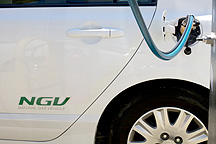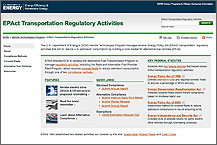EPAct State and Alternative Fuel Provider Fleet Newsletter: Summer 2012
The summer 2012 issue of the EPAct State and Alternative Fuel Provider Fleet Newsletter includes the following articles:
- DOE Reviews Comments on Proposed Rulemaking
- Covered Fleets Look for Alternative Fuel Vehicles to Buy
- Fleets Meet Requirements by Purchasing and Using Biodiesel
- Newly Covered Fleets Learn About Requirements
- DOE Helps Fleets Find Laws and Incentives in Their Area
- Fleets Buy and Sell Credits
- EPAct Workshops Spur Alternative Fueling Infrastructure Discussion
- Covered Fleets Meet Requirements in Fiscal Year 2011
- Tools and Resources Help Regulated Fleets
DOE Reviews Comments on Proposed Rulemaking
The U.S. Department of Energy (DOE) is reviewing comments on the notice of proposed rulemaking (NOPR) issued October 31, 2011, under Section 133 of the Energy Independence and Security Act of 2007, and preparing a final rule. This rulemaking would allocate credits under the Alternative Fuel Transportation Program for certain electric drive vehicles and investments in qualified alternative fuel infrastructure, nonroad equipment, and emerging technologies. DOE collected comments on the NOPR until December 30, 2011.
Under the proposal, DOE would allocate the following credits under the program's Standard Compliance mechanism for vehicles that do not otherwise qualify as alternative fuel vehicles (AFVs):
- Hybrid electric vehicle: one-half credit
- Plug-in electric drive vehicle: one-half credit
- Fuel cell electric vehicle: one-half credit
- Neighborhood electric vehicle: one-fourth credit.
The proposed rulemaking would also allocate one-half credit for the acquisition of a medium- or heavy-duty hybrid electric or plug-in electric drive vehicle that does not otherwise qualify as an AFV, and provide credit for investments in qualified alternative fuel infrastructure, alternative fuel nonroad equipment, and emerging technologies, with fleets receiving one credit for every $25,000 invested.
Learn more about the NOPR in the full notice in the Federal Register.
Covered Fleets Look for Alternative Fuel Vehicles to Buy

The Energy Policy Act (EPAct) requires covered fleets to acquire a certain percentage of alternative fuel vehicles each year based on the number of light-duty vehicles they acquire. Light-duty AFVs include dedicated or dual-fuel vehicles designed to operate on at least one alternative fuel.
The expanding availability of alternative fuels and advanced vehicles makes it easier than ever to reduce petroleum use, cut emissions, save on fuel costs, and comply with EPAct requirements. The Clean Cities 2012 Vehicle Buyer's Guide helps fleets explore AFV options. Fleets can also find available vehicles by searching for light-duty alternative fuel vehicles on the Alternative Fuels Data Center (AFDC).
Fleets Meet Requirements by Purchasing and Using Biodiesel
Under Standard Compliance, covered state and alternative fuel provider fleets may meet part of their EPAct requirements each year by purchasing biodiesel in blends of 20% biodiesel (B20) or higher for use in medium- or heavy-duty vehicles. Fleets can use this option to meet up to 50% of their AFV-acquisition requirement (up to 100% for biodiesel fuel providers). Learn more about purchasing biodiesel for Standard Compliance.
Under Alternative Compliance, there is no cap on the portion of requirements that can be met through biodiesel use, and there is no restriction on the blend level used.
Fleets may not bank or trade biodiesel credits. Alternative fuel vehicle credits, however, may be banked or traded, so fleets should apply biodiesel credits before AFV acquisitions. When pairing biodiesel credits with AFV acquisitions, fleets may end up with credits to bank or trade.
Newly Covered Fleets Learn About Requirements
The State and Alternative Fuel Provider Fleet Program requires covered fleets either to acquire alternative fuel vehicles as a percentage of their annual light-duty vehicle acquisitions or to employ other petroleum-reduction methods in lieu of acquiring AFVs. State government and alternative fuel provider fleets covered by the Energy Policy Act can learn about requirements and find compliance resources on the EPAct Transportation Regulatory Activities website in these sections:
- Covered Fleets – Determine whether your state government or alternative fuel provider fleet is covered by EPAct.
- Compliance Methods – Learn about the Standard Compliance and Alternative Compliance methods to meet your EPAct requirements.
- Resources – Find compliance tools, publications, and answers to questions about EPAct.
For help with understanding and meeting EPAct requirements, state and alternative fuel provider fleets may contact the Regulatory Information Line at regulatory.info@nrel.gov or 202-586-9171.
DOE Helps Fleets Find Laws and Incentives in Their Area
DOE offers a tool on the Alternative Fuels Data Center to help state and alternative fuel provider fleets find laws and incentives in their area. The laws and incentives database can help regulated fleets make informed decisions about using alternative fuels and purchasing alternative fuel vehicles. The database includes federal and state laws and incentives, and examples of well-crafted local laws and incentives. EPAct-regulated fleets often find the state search valuable because it offers an overview of region-specific opportunities for fleets.
Fleets Buy and Sell Credits
Covered fleets earn credits for light-duty alternative fuel vehicles they acquire beyond their base AFV-acquisition requirements. After satisfying these requirements, fleets also may earn credit for acquiring medium- and heavy-duty AFVs.
Credits from AFV acquisitions may be banked for future use or traded. Credit trading is allowed between fleets that need to buy or sell banked credits. Fleets with credit deficiencies or excess credits can advertise their intent to buy or sell credits by posting a message on the credits bulletin board. A list of fleets with excess credits is also available to facilitate credit trading.
After you locate a buyer or seller, use the Proof of Credit Transfer form. This form requires the original signatures of the buyer and seller. DOE will notify the buyer and seller when the trade is approved.
Learn more about banking and trading credits.
EPAct Workshops Spur Alternative Fueling Infrastructure Discussion
EPAct workshops bring fuel retailers together with experts and leaders from DOE, the National Renewable Energy Laboratory, and the alternative fuel industry to provide current information on alternative transportation fuels, from production and blending to distribution and deployment.
The Dallas-Fort Worth Clean Cities coalition hosted an EPAct workshop for alternative fuel retailers on January 10, 2012. This workshop educated public fuel retail store owners and business managers about alternative fuel production and distribution.
The Southeast Louisiana Clean Fuels Partnership hosted an EPAct workshop for alternative fuel infrastructure stakeholders on May 22, 2012. This workshop brought together regulated fleet representatives, Clean Cities stakeholders, and fuel providers to identify opportunities to improve the availability of alternative fueling infrastructure.
Learn more about EPAct workshops.
Covered Fleets Meet Requirements in Fiscal Year 2011
In fiscal year 2011, 291 state and alternative fuel provider fleets complied with their EPAct requirements using either Standard Compliance or Alternative Compliance. The 279 fleets that used Standard Compliance exceeded their aggregate alternative fuel vehicle–acquisition requirements by 61%. The 12 covered fleets that used Alternative Compliance exceeded their aggregate petroleum-use-reduction requirements by 89%. Find more program results in the 2011 annual report.
Tools and Resources Help Regulated Fleets
DOE has tools to make decision making easier for regulated fleets. In partnership with the Clean Cities program, DOE provides tools through the AFDC. State and alternative fuel provider fleets often use these AFDC tools to help meet EPAct requirements:
- Alternative Fueling Stations – Find alternative fueling stations, maps, and driving directions.
- Vehicle Cost Calculator – Compare cost of ownership and emissions for most vehicle models.
- Light-Duty Vehicles – Compare light-duty alternative fuel vehicles, electric vehicles, and hybrids.
Learn more about these tools in the Clean Cities tools brochure, which lists descriptions and URLs of more than 20 online tools that can help fleets make informed decisions about alternative fuels and vehicles and other petroleum-saving measures.

